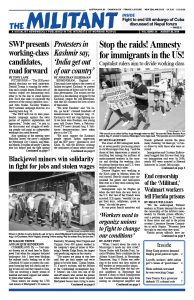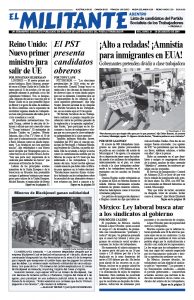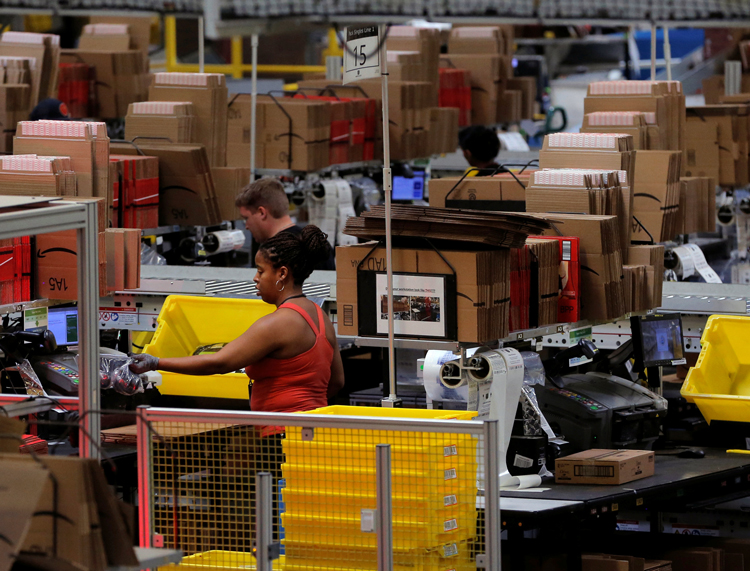According to acting Department of Labor Secretary Patrick Pizzella, July’s official unemployment rate of 3.7% “demonstrates the steady and consistent growth of the American economy.” But for millions of working people facing low-wage jobs, many at part-time hours; layoffs; and rising debts to cover basic expenses, assertions about the “good times” provided under capitalism do not ring true.
Lowe’s Co., a hardware retail giant, announced Aug. 1 that it will lay off thousands of workers, from assemblers to janitors. Workers being eliminated include many who have worked full time for the company for years helping to put together grills, wheelbarrows and other products. The bosses plan to outsource this work, a common step that many employers take to transfer work to other companies that pay lower wages and offer fewer benefits.
Lowe’s, in competition with Home Depot to boost its profits off the back of workers, has already closed 140 stores over the past year. Workers laid off in the most recent job cuts, including those who have worked at the company for many years, will not get severance pay. Instead, they will receive up to two weeks “transition pay” and the “chance” to apply for jobs elsewhere in the company, without being guaranteed the same wage they had been paid.
With union officials refusing to mobilize workers and lead labor struggles to push back the employers’ offensive in retail or other industries in recent years, bosses at Lowe’s and elsewhere hope they can enforce these kind of attacks without meeting any serious resistance from workers.
“The Retail Reckoning Has Only Just Begun,” headlined an article in Barron’s magazine Aug. 3. It reports that 7,500 store closings have already been announced this year, on pace to set a new record. Many have depleted once thriving malls. The rising dominance in retail sales of Amazon and Walmart, trying through robotization and speedup to outcompete each other, accounts for much of this.
Over the past year, for example, Sears Holdings, the largest U.S. retailer until 1991, declared bankruptcy. So did Payless Holdings for the second time, in February, closing 2,500 stores in the U.S. and Canada.
Retail sales have been a key component to the so-called economic recovery, but it’s based on trapping millions of working people in ever growing indebtedness. Consumer debt, not counting mortgages, has climbed to $4 trillion, higher than it has ever been. This includes student debt now at $1.5 trillion and $1.3 trillion in auto debt, up 40 percent over the past decade.
Consumer spending accounts for more than two-thirds of the gross domestic product.
While costs for cars, housing and medical care have gone up, wages over the past several decades have remained stagnant. More than one-third of workers are paid less than $15 an hour. And 4 million workers seeking full-time jobs are forced to accept part-time hours, according to government figures.
Job openings in manufacturing, mining and construction are slowing down this year compared to 2018, when these jobs increased by 58,000 a month. That figure is down to 23,000 a month so far in 2019 — and a mere 15,000 in July, the Labor Department reports.
Plant layoffs in towns and rural areas continue to have a devastating impact on working people living there. In Fayetteville, Tennessee, the Goodman Manufacturing air conditioning plant will lay off about 700 workers by the end of September, the company announced July 31. The factory had been one of the largest employers in town.
A boon for the banks is the high interest rates working people are forced to pay on credit card debts, topping 17 percent on average in May. There is about $850 billion in credit card debt outstanding, according to the Federal Reserve, a record high amount. In the first quarter of 2019, U.S. households owed an average of $8,390 on these cards, up 9% from four years earlier.
And when the next downturn hits and making payments on these debts becomes harder, more working people will discover that things we thought were “ours” are in fact owned by credit card companies and other loan sharks.


